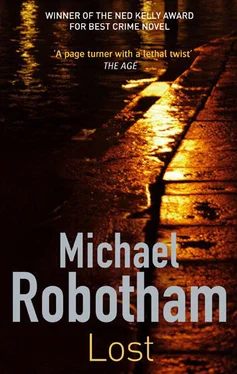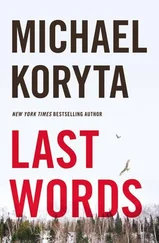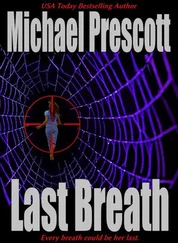It's a snapshot taken on the seafront at Blackpool. We were on a day trip and Daj is wearing a dozen petticoats and lace-up shoes. Her hair is hidden beneath a scarf and she is scowling at the photographer because my stepfather has asked her to smile. Luke is swinging from her hand and laughing. I'm in the background, staring at the bottom of one of my sandals as if I just stepped in something.
“You were always looking at the ground,” Daj used to tell me. “And you still managed to fall over your own feet.”
I remember that day. There was a talent competition on the pier. Hundreds of people were sitting in the sun listening to amateur Joe Blows singing songs and telling jokes. Luke kept tugging on Daj's hand, saying he wanted to sing. He was only four. She told him to be quiet.
Next thing we were watching this guy in a checked jacket and slicked-down hair pulling faces and telling jokes. He suddenly stopped because a little kid had walked right onto the stage. It was Luke with a blond cowlick and ice cream–stained shorts. This comedian made a big fuss about lowering the microphone so he could ask Luke a question.
“Well now, little boy, what's your name?”
“Luke.”
“Are you here on a holiday, Luke?”
“No, I'm here with my mum.”
Everyone laughed and Luke frowned. He couldn't work out why they were laughing.
“Why are you up here, Luke?”
“I wanna sing a song.”
“What are you gonna sing?”
“I don't know.”
They laughed again and I could have died, but Luke just stood there and stared, mesmerized by the crowd. Even when Daj dragged him off the stage and they all clapped, Luke didn't wave or acknowledge them. He just stared.
Joe is still sifting through the contents of my wallet. “Everyone leaves a trail,” he says. “It isn't just scraps of paper and photographs. It's the impression we make on other people and how we confront the world.”
He glances to his right. “You take that couple over there.”
A man and a woman are ordering lunch. He's wearing a casual jacket and she's dressed in a classic A-line skirt and cashmere sweater.
“Notice how he doesn't look at the waiter when he's being told the specials. Instead he looks down as though reading from the menu. Now, his companion is different. She's leaning forward, with her elbows on the table and her hands framing her face. She's interested in everything the waiter says.”
“She's flirting with him.”
“You think so? Look at her legs.”
A shoeless stockinged foot is raised and resting on her partner's calf. She's teasing him. She wants him to loosen up.
“You have to look at the whole picture,” says Joe. “I know you can't remember things—not yet anyway. So you have to write things down or make mental notes. Flashes, images, words, faces, whatever comes to you. They don't make sense right now but one day they might.”
A waitress arrives at the table with a plate of sardines.
“Compliments of the chef,” she says.
I raise my glass to Alberto who is standing in the kitchen door. He thumps his chest like a gladiator.
Sucking fish oil from his fingers, Joe begins to focus on the bikini and who might have had it. Mickey was wearing very little when she disappeared and her beach towel became the most important piece of evidence against Howard.
All investigations need a breakthrough—a witness or a piece of evidence that turns theory into fact. In Mickey's case it had been her striped beach towel. A woman walking her dog had found it at East Finchley Cemetery. It was heavily stained with blood, vomit and traces of hair dye. Howard had no alibi for when Mickey disappeared and had been working at the cemetery in the days that followed.
A precipitin test confirmed the blood on the towel to be human—A negative, Mickey's group (along with seven percent of the population). The DNA tests were conclusive.
Without hesitation, I ordered a search of the flower beds and recently dug graves. We used ground-penetrating radar and Caterpillar diggers, as well as SOCO teams with hand spades and sieves.
Campbell went ballistic, of course. “You're digging up a fucking cemetery!” he yelled. I had to hold the phone six inches from my ear.
I took a deep breath. “I'm conducting a limited search, Sir. We have the cemetery records showing all the recently dug graves. Anything that doesn't match is worth investigating.”
“What about the headstones?”
“We'll try not to touch them.”
Campbell began listing all the people who had to sanction an exhumation, including a County Court Judge, the Administrator of Cemeteries and the Chief Medical Officer of Westminster Council.
“We're not snatching bodies or robbing graves,” I reassured him.
Eighty feet of lawn and flower bed had been dug up by then. Paving stones were propped against walls and turf rolled into muddy faggots. Howard had helped plant the garden two months earlier for Westminster in Bloom, a flower competition.
Twenty-two other sites were also excavated within the cemetery. Although it sounds like a clever hiding place, it's not an easy thing to conceal a body in a graveyard. First you have to bury it without anyone noticing, most probably at night. And it doesn't matter if you believe in ghosts or not, very few people are comfortable in cemeteries after dark.
A media blackout covered the dig, but I knew it couldn't hold. Someone must have phoned Rachel and she turned up that first afternoon. Two police officers had to hold her back behind the police tape. She fought against their arms, pleading with them to let her go.
“Is it Mickey?” she yelled at me.
I pulled her to one side, trying to calm her down. “We don't know yet.”
“You found something?”
“A towel.”
“Mickey's towel?”
“We won't know until—”
“Is it Mickey's towel?”
She read the answer in my eyes and suddenly broke free, running toward the trench. I pulled her back before she reached the edge, wrapping my arms around her waist. She was crying then, with her arms outstretched, trying to throw herself into the hole.
There was nothing I could say to comfort her—nothing that would ever be able to comfort her.
Afterward, I walked her up to the chapel, waiting for a police car to take her home. We sat outside on a stone bench beneath a poster on the noticeboard, which said, CHILDREN ARE THE HOPE OF THE WORLD.
Where! Show me! You can want them, worry about them, love them with all your being, but you can't keep them safe. Time and accidents and evil will defeat you.
Somewhere in the restaurant kitchen a tray of glasses shatters on the floor. Diners pause momentarily, perhaps in sympathy, and then conversations begin again. Joe looks across the table, inscrutable as ever. He'll say it's the Parkinson's mask but I think he enjoys being impenetrable.
“Why the hair dye?” he asks.
“What do you mean?”
“You said there were traces of hair dye on the towel. If Howard snatched Mickey off the stairs and killed her in his flat, why bother dyeing her hair?”
He's right. But the towel might have been stained earlier. Rachel could have colored her hair. I didn't ask her. I can see Joe filing the information away for future reference.
My main course has arrived but I'm no longer hungry. The morphine is doing this to me—ruining my appetite. I roll the spaghetti around a fork and leave it resting on the plate.
Joe pours another glass of wine. “You said you had doubts about Howard. Why?”
“Oddly enough, it's because of something you once said to me. When we first met and I was investigating the murder of Catherine McBride, you gave me a profile of her killer.”
“What did I say?”
Читать дальше












